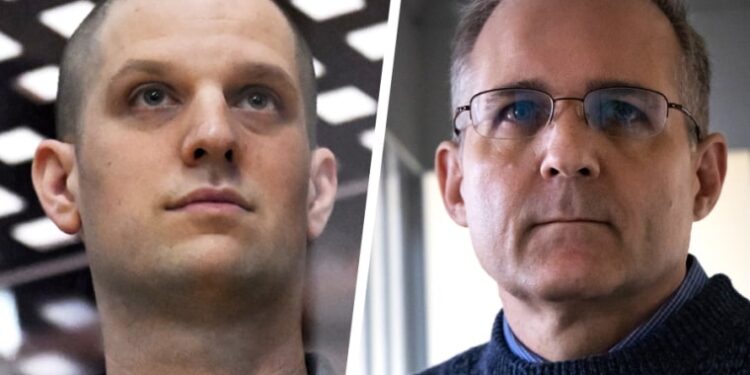Three U.S. citizens — including journalist Evan Gershkovich and Marine veteran Paul Whelan — wrongly imprisoned in Russia were released Thursday, part of a major multinational prisoner exchange the likes of which has not been seen since the Cold War.
The massive deal, cut among six nations, involves 24 people, including 12 German nationals and a legal U.S. permanent resident currently held in Russia, and eight Russians imprisoned in the U.S., Germany, Slovenia, Norway and Poland.
Gershkovich, a reporter at The Wall Street Journal, was arrested in March 2023 while reporting in Yekaterinburg, an industrial city east of Moscow. In July, he was convicted of espionage in a Russian court in a trial widely condemned as a sham as his publication vociferously advocated for his release across its front pages. He was sentenced to 16 years in prison.
Whelan, a businessman who has been detained since visiting Russia for a friend’s wedding in 2018, was also convicted of espionage and had been serving a 16-year sentence in a penal colony. The U.S. has denied those charges.
Whelan was excluded from two previous prisoner exchanges, and in an interview from prison last December, Whelan told the BBC that he considered the U.S.’s decision to leave him behind a “serious betrayal.”

President Joe Biden had gathered with the family members of those being returned to the U.S. ahead of the swap being announced, national security adviser Jake Sullivan said.
“This morning, the president is gathering the families of Paul Whelan, Evan Gershkovich, Alsu Kurmasheva, and Vladimir Kara-Murza at the White House to share with them the news that an exchange is underway to secure the release of their loved ones from Russia,” he said before the swap was finalized.
Radio Free Europe/Radio Liberty journalist Alsu Kurmasheva was and Vladimir Kara-Murza Jr., a dual Russian-British national and U.S. permanent resident who was jailed on treason charges for 25 years in April 2023, were also released.
The prisoners in Russia were flown to Turkey before heading home.
The complex prisoner swap is a rare example of cooperation amid heightened political tensions between the U.S. and Russia, including from sanctions imposed on Russia and Russian officials over the invasion of Ukraine starting in 2022. Relations between the two countries had been strained before the war, following Russian interference in the 2016 election and its annexation of Crimea.
The most notable Russian prisoner released as part of the swap is Vadim Krasikov, who was jailed for life in Germany for the 2019 murder in Berlin of Zelimkhan Khangoshvili, a former Chechen separatist, in what prosecutors believed was a Russian state-sanctioned assassination. Russian authorities say they believed Khangoshvili was involved in multiple attacks on Russian soil, including the 2010 suicide bombings on the Moscow Metro.
The U.S. released three Russian prisoners, including an intelligence operative facing charges of smuggling U.S. technology and ammunition to the Russian military. Slovenia released two Russian prisoners, Norway and Poland each released one.
Russia released 12 German prisoners, most of them connected to opposition leader Alexei Navalny who died in prison in February, following a yearslong struggle against official corruption and President Vladimir Putin’s government that included several poisoning attempts.
The Biden administration has been working on Thursday’s swap since December 2022 after the most recent high-profile prisoner swap, when WNBA star Brittney Griner was exchanged for notorious Russian arms dealer Victor Bout, known as the “Merchant of Death.”
Griner was arrested at an airport near Moscow after two vape cartridges containing hashish oil were found in her luggage.
The swap raised a debate about the risks of exchanging wrongfully detained Americans for Russian prisoners, with critics pointing out that there was no equivalence between the crimes Griner and Bout were convicted of, and that it may encourage foreign adversaries to kidnap Americans abroad and use them as bargaining chips.
Discussions involved several swap offers with Russia. Secretary of State Antony Blinken was the first U.S. official to reach out to Russia, through his counterpart, and national security adviser Sullivan engaged his German counterpart, a senior administration official said.
A breakthrough came in January 2024, when Biden called German Chancellor Olaf Scholz and invited him to the White House, telling him a swap would be on the agenda. The goal was for a deal to include Russian opposition leader Navalny, and the release of Krasikov. Scholz later indicated he was receptive.
Then, days later, Navalny died at an arctic penal colony in Russia, setting off a new round of discussions that led to Thursday’s larger swap, the senior administration official said.
This is a breaking story. Please check back for details.







